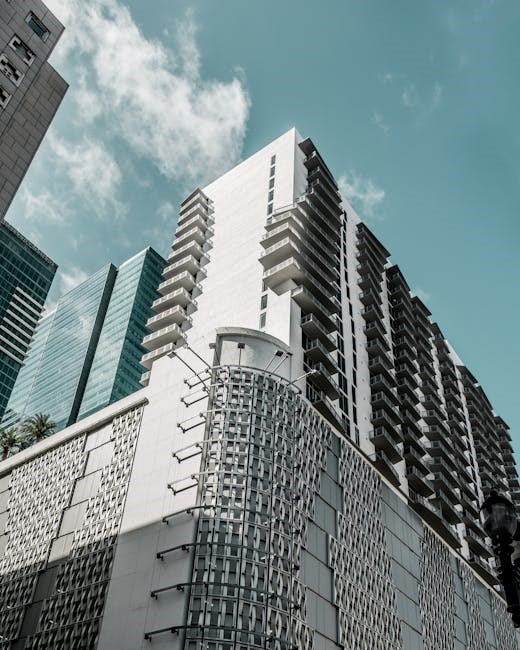
The 2024 Florida condo laws aim to enhance building safety, financial transparency, and governance standards following recent legislative updates. These reforms address structural integrity, reserve funding, and ethical practices to protect residents and ensure long-term sustainability of condominium communities across the state.
Overview of the 2024 Legislative Updates
The 2024 Florida condo laws introduce comprehensive updates focused on enhancing building safety, financial stability, and governance practices. Key changes include stricter inspection requirements, improved reserve funding, and updated ethical standards for board members. These updates aim to address past structural and financial challenges, ensuring safer living conditions and greater transparency for residents. The legislation also streamlines processes for condo associations, providing clearer guidelines for compliance. By prioritizing accountability and proactive maintenance, the new laws aim to protect property values and resident well-being. These reforms reflect a commitment to modernizing condo governance and addressing emerging issues in Florida’s real estate market, promoting a more secure and sustainable future for condo communities statewide.
Key Areas of Focus in the 2024 Condo Laws
The 2024 Florida condo laws emphasize three primary areas: building safety, financial oversight, and ethical governance. Stricter inspection timelines and reserve funding requirements are central to ensuring structural integrity and preparedness for future repairs. Enhanced financial transparency mandates detailed budgetary disclosures, empowering residents with clearer insights into their community’s fiscal health. Furthermore, the legislation establishes a new code of ethics for board members, aiming to reduce conflicts of interest and improve decision-making processes. These focus areas collectively address critical issues affecting Florida’s condo communities, fostering a more secure, transparent, and accountable living environment for residents while safeguarding property investments and community well-being.
Building Safety and Structural Integrity
The 2024 Florida condo laws prioritize building safety through mandatory inspections, strengthened structural standards, and enforced maintenance timelines to prevent failures and ensure resident safety.
Mandatory Inspections and Requirements
The 2024 Florida condo laws mandate regular inspections for buildings, specifying frequency and qualifications for inspectors. They require detailed documentation of findings and necessary repairs, ensuring transparency and accountability. Condo boards must maintain records of all inspections, including structural assessments, particularly for older buildings. Funding provisions are outlined for inspections and repairs, possibly through special assessments or reserves. Penalties may apply for non-compliance, such as fines or legal actions against condo boards. These measures aim to enhance building safety, prevent future tragedies, and provide a clear framework for inspections, documentation, funding, and enforcement to ensure proper building maintenance.
Capital Reserve Studies and Funding
The 2024 Florida condo laws require associations to conduct reserve studies every five years to assess long-term funding needs for major repairs and replacements. These studies must include a visual inspection and inventory of components like roofs, elevators, and plumbing. Boards must fund reserves annually based on study recommendations, ensuring adequate resources for future expenses. Failure to comply may result in penalties for board members. The laws emphasize transparency, requiring detailed documentation of reserve funds and expenditures. Associations are prohibited from waiving or reducing reserve contributions without a majority vote, except in cases of natural disasters, where legislative relief may be available. This ensures financial preparedness and accountability for maintaining building integrity and safety.
Exemptions for Low-Rise Buildings
Under the 2024 Florida condo laws, low-rise buildings with three stories or fewer are exempt from certain structural integrity reserve study (SIRS) requirements. This exemption aims to reduce regulatory burdens on smaller buildings while maintaining safety standards. However, these buildings must still comply with other aspects of the law, such as financial transparency and reserve funding for essential repairs. The exemption applies to buildings without an elevator or where the highest residential unit is no more than three stories above grade. This provision balances safety concerns with practical considerations for smaller condominiums, ensuring they are not disproportionately impacted by the new regulations. The exemption does not absolve these buildings of maintaining structural integrity but provides flexibility in meeting the requirements. This approach reflects a tailored strategy to address the unique needs of different types of condominium properties across Florida.

Financial Requirements and Reserve Funding
The 2024 Florida condo laws mandate robust financial practices, including detailed annual budgets and reserve studies. These requirements ensure funds are allocated for maintenance, repairs, and long-term capital expenditures, promoting fiscal accountability and preventing financial shortfalls that could jeopardize community stability. The laws emphasize transparency in financial disclosures, requiring clear documentation of reserve funds and expenditures. This shift towards proactive financial planning aims to safeguard condominium communities from unexpected costs and enhance overall financial health. By streamlining reserve funding processes, the new regulations foster a more secure and sustainable environment for residents and investors alike. Compliance with these financial standards is non-negotiable, ensuring the integrity of condominium associations statewide.
Annual Budget and Reserve Requirements
The 2024 Florida condo laws introduce stricter guidelines for annual budgets and reserve funding. Condo associations must now prepare detailed budgets separating operating expenses from reserve allocations, ensuring transparency and accountability. Reserves must cover anticipated major repairs and replacements, with a mandatory reserve study every five years to assess future needs. Boards are required to present these documents at annual meetings and provide copies to owners upon request. Failure to comply may result in penalties. These changes aim to prevent financial shortages and ensure that communities are prepared for long-term maintenance. The laws also emphasize the importance of avoiding commingling of funds between operating and reserve accounts. This ensures that reserves are exclusively used for their intended purposes, safeguarding the financial health of condominium communities statewide.

Transparency in Financial Disclosures
The 2024 Florida condo laws emphasize enhanced financial transparency, requiring associations to openly share detailed financial records with owners. This includes annual budgets, reserve studies, and expenditure reports. Boards must now disclose all financial matters at meetings and provide owners with access to audited financial statements upon request. The laws also mandate clear documentation of reserve funding and expenditures to prevent misuse. These reforms aim to foster trust and accountability within condo communities. Penalties for non-compliance underscore the importance of adhering to these transparency measures. By ensuring financial openness, the new laws empower owners to make informed decisions and hold their boards accountable for responsible fiscal management.

Condo Board Governance and Ethics
The 2024 Florida condo laws introduce stricter governance and ethical standards for board members to ensure accountability and fair decision-making processes within condominium communities.
New Code of Ethics for Board Members
The 2024 Florida condo laws establish a new code of ethics for board members, emphasizing transparency, accountability, and fairness in decision-making. This code mandates that board members act in the best interest of the community, disclose conflicts of interest, and maintain confidentiality. Prohibited actions include self-dealing and improper use of association funds. Violations may result in penalties, including removal from office. These ethical standards aim to build trust and ensure that board members prioritize the needs of all residents, fostering a more harmonious and well-governed condominium environment. The code aligns with broader efforts to enhance governance and accountability within Florida’s condominium communities.
Training Requirements for Condo Board Members
The 2024 Florida condo laws mandate training for board members to ensure they are well-versed in governance, ethics, and financial management. Members must complete a state-approved training program within 90 days of taking office, covering topics such as financial reporting, reserve studies, and conflict-of-interest laws. Existing board members must comply by January 1, 2025, while new members have 90 days from election. This training aims to improve decision-making, transparency, and accountability, fostering a more informed and responsible leadership. Non-compliance may result in suspension from voting on board matters, emphasizing the importance of adherence to these educational requirements.

Disclosure Requirements for Condo Buyers
Under the 2024 Florida condo laws, sellers must provide buyers with detailed documentation, including financial statements, reserve studies, and any pending legal issues, ensuring transparency.

Documentation and Transparency
The new Florida condo laws emphasize comprehensive documentation and enhanced transparency. Buyers now receive detailed financial statements, reserve studies, and clear disclosures about the condo’s governance and potential liabilities. This ensures they are fully informed about the property’s financial health and any existing issues. Additionally, condo boards are required to maintain accessible records, including meeting minutes and budgets, to promote accountability and trust among unit owners. These measures aim to prevent surprises and foster a more transparent real estate market, aligning with the broader goals of the 2024 legislative updates to protect consumers and uphold community standards effectively.
Implications for Real Estate Transactions
The new Florida condo laws have significant implications for real estate transactions. Buyers now face stricter requirements, including detailed reserve studies and structural inspections, which must be reviewed before finalizing a purchase. This increased scrutiny ensures buyers are fully informed about the property’s condition and financial stability. However, it may also lengthen the transaction process. Sellers and boards must provide enhanced documentation, creating a more transparent market. These changes aim to prevent hidden issues and protect buyers from unforeseen liabilities. While the added layers of disclosure may introduce some complexity, they ultimately foster a more secure and informed real estate environment, benefiting both buyers and sellers in the long term.
The 2024 Florida condo laws represent a comprehensive overhaul designed to address critical issues in building safety, financial management, and governance. These reforms aim to restore confidence in the condominium market following recent challenges. Moving forward, condo boards, owners, and real estate professionals must prioritize compliance with the new regulations. This includes conducting mandatory inspections, maintaining adequate reserves, and adhering to the updated code of ethics; Residents are encouraged to stay informed about their rights and responsibilities under the new laws. By taking proactive steps to implement these changes, Florida’s condo communities can ensure a safer, more transparent, and financially stable future for all stakeholders involved.